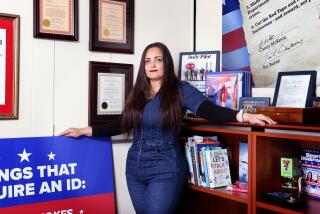The Councilman Whose Courage Set Him Up for Praise
- Share via
Funny how a picture stays with you. When I think of Bob Gentry’s public life in Orange County, what comes to mind is a 1989 newspaper photo of him taken shortly after his longtime male companion died of AIDS. Gentry, then the mayor of Laguna Beach, was photographed holding his companion’s teddy bear.
What an odd photo to let someone take, I thought then. He’s just setting himself up for ridicule .
It was only after meeting Gentry and talking to him a few times over the years did I come to understand that the photo was, indeed, worth a thousand words. On the surface, it seemed only to capture the sensitivity of the man. I came to realize it also captured his courage.
Then, as now, Gentry refused to sell out. He refused to conceal grief when he felt grief. And even though he had long ago announced that he is gay, he also refused to play down that fact when the most significant person in his life had just died.
Gentry, now 55, announced this week that he won’t run for reelection in November to the Laguna Beach City Council. He’s wrapping up his third four-year term as councilman and sometime mayor and says he needs to devote himself to rebuilding two homes destroyed by last year’s fires.
Normally, it’s not big news when a councilman from a town of 25,000 steps down. But as the county’s first openly gay elected official, Gentry’s imminent passing from the scene is worth at least one blast from the trumpet.
Gentry was living on Skyline Drive in 1979 when he petitioned the city to save two 100-year-old pine trees next to his house that were imperiled by new development. After his successful effort, he got involved in his neighborhood association and then politics.
“I was totally anonymous at the time,” he said Thursday from his office at UC Irvine, where is associate dean of students. “I hadn’t done a thing. I had voted, of course, and was a little intrigued with the cantankerousness of Laguna Beach politics, but other than that, I had no ambition, no interest at all in running for office.”
By 1982, however, Gentry decided to run for council. During one of the Saturday morning strategy sessions at his home, one of his supporters--most of whom were heterosexuals--asked about the gay issue. “People kind of looked at each other, it was kind of awkward, and I just said, ‘What do you mean, the gay issue? I am who I am, you let me handle it. I’m going to be totally open and honest with anyone who asks and we’ll just go from there.’ ”
He got elected but it wasn’t until the next year--on Mother’s Day, 1983--Gentry said, that his feelings about publicly proclaiming his homosexuality crystallized. A Times reporter had interviewed Gentry and others for an article on being gay in Orange County. At the end of the interview, the reporter wanted to double-check the spelling of his name.
“I said, ‘You mean use my name?’ ”
Although his sexual orientation was known locally, “There was something about the L.A. Times, Sunday edition that just brought up in me all the fear I had been taught over the years--that you really shouldn’t talk about it--and what I finally realized was that it was exactly what I should talk about--that greatest fear is what I should talk about.
“I was raised in suburban Boston in a very Victorian, very middle-class atmosphere, and I learned like everyone else that queers and homos were evil, awful sick people. I remember very vividly as a young teen-ager being convinced that I was the only one in the world, that no one else had the same feelings I did.”
During his public life, Gentry has been an advocate of AIDS education and prevention, in addition to backing gay-rights issues. But he has not been a one-note candidate and says he is most proud that he worked on a wide range of issues, most notably environmental.
But because Gentry never shied away from being gay, he has been a target. When AIDS claimed his companion, Gary Burdick, in 1989, Gentry got an anonymous card that read, “One down, one to go.”
And although he says he’s grown “philosophical” about personal attacks on him, the anti-gay rhetoric still bothers him. “It really does, because it’s based on lack of information and education, and that’s what’s really frustrating about this for me. Most of the anti-gay stuff I’ve heard is a pack of lies. Criticize me for my politics, criticize me for my sloppy thinking or my behavior or what I do wrong, but not for who I am.”
It’s a neat, ironic twist that Gentry probably will be remembered for just that--who he is. Long after his efforts against off-shore drilling are forgotten, people should remember the dignified courage with which he fought battles, many of which we probably never heard about.
They’re the kind of battles the Jackie Robinsons of the world fight.
Not even Gentry knew right away what his openness represented. “Not until I was there,” he said. “I went into this wet behind the ears. I didn’t realize any of the ramifications of my being gay until I was sitting up on the dais and realized that I now was a community leader and needed to act like one.”
Dana Parsons’ column appears Wednesday, Friday and Sunday. Readers may reach Parsons by writing to him at The Times Orange County Edition, 1375 Sunflower Ave., Costa Mesa, Calif. 92626, or calling (714) 966-7821.
More to Read
Sign up for Essential California
The most important California stories and recommendations in your inbox every morning.
You may occasionally receive promotional content from the Los Angeles Times.










